The AMD Zen and Ryzen 7 Review: A Deep Dive on 1800X, 1700X and 1700
by Ian Cutress on March 2, 2017 9:00 AM ESTBenchmarking Performance: CPU Encoding Tests
One of the interesting elements on modern processors is encoding performance. This includes encryption/decryption, as well as video transcoding from one video format to another. In the encrypt/decrypt scenario, this remains pertinent to on-the-fly encryption of sensitive data - a process by which more modern devices are leaning to for software security. Video transcoding as a tool to adjust the quality, file size and resolution of a video file has boomed in recent years, such as providing the optimum video for devices before consumption, or for game streamers who are wanting to upload the output from their video camera in real-time. As we move into live 3D video, this task will only get more strenuous, and it turns out that the performance of certain algorithms is a function of the input/output of the content.
7-Zip
One of the freeware compression tools that offers good scaling performance between processors is 7-Zip. It runs under an open-source licence, is fast, and easy to use tool for power users. We run the benchmark mode via the command line for four loops and take the output score.
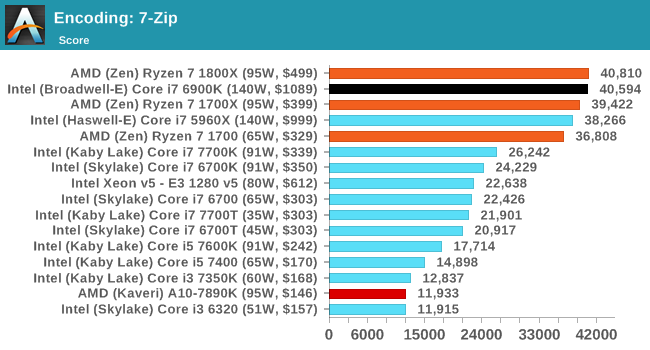
WinRAR 5.40
For the 2017 test suite, we move to the latest version of WinRAR in our compression test. WinRAR in some quarters is more user friendly that 7-Zip, hence its inclusion. Rather than use a benchmark mode as we did with 7-Zip, here we take a set of files representative of a generic stack (33 video files in 1.37 GB, 2834 smaller website files in 370 folders in 150 MB) of compressible and incompressible formats. The results shown are the time taken to encode the file. Due to DRAM caching, we run the test 10 times and take the average of the last five runs when the benchmark is in a steady state.
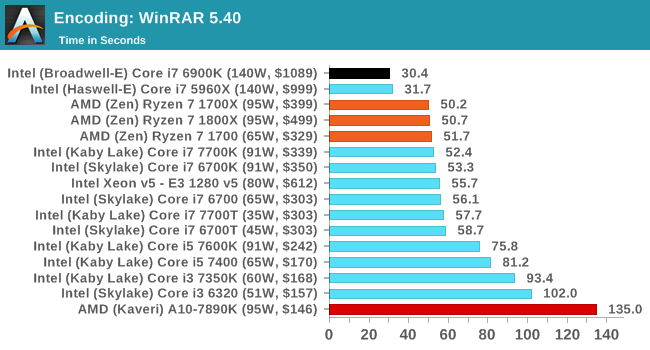
AES Encoding
Algorithms using AES coding have spread far and wide as a ubiquitous tool for encryption. Again, this is another CPU limited test, and modern CPUs have special AES pathways to accelerate their performance. We often see scaling in both frequency and cores with this benchmark. We use the latest version of TrueCrypt and run its benchmark mode over 1GB of in-DRAM data. Results shown are the GB/s average of encryption and decryption.
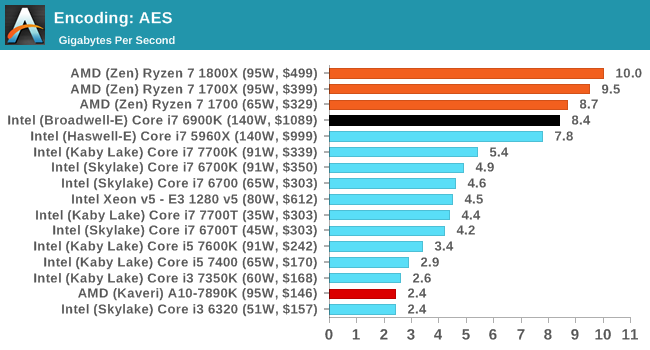
HandBrake H264 and HEVC
As mentioned above, video transcoding (both encode and decode) is a hot topic in performance metrics as more and more content is being created. First consideration is the standard in which the video is encoded, which can be lossless or lossy, trade performance for file-size, trade quality for file-size, or all of the above can increase encoding rates to help accelerate decoding rates. Alongside Google's favorite codec, VP9, there are two others that are taking hold: H264, the older codec, is practically everywhere and is designed to be optimized for 1080p video, and HEVC (or H265) that is aimed to provide the same quality as H264 but at a lower file-size (or better quality for the same size). HEVC is important as 4K is streamed over the air, meaning less bits need to be transferred for the same quality content.
Handbrake is a favored tool for transcoding, and so our test regime takes care of three areas.
Low Quality/Resolution H264: He we transcode a 640x266 H264 rip of a 2 hour film, and change the encoding from Main profile to High profile, using the very-fast preset.
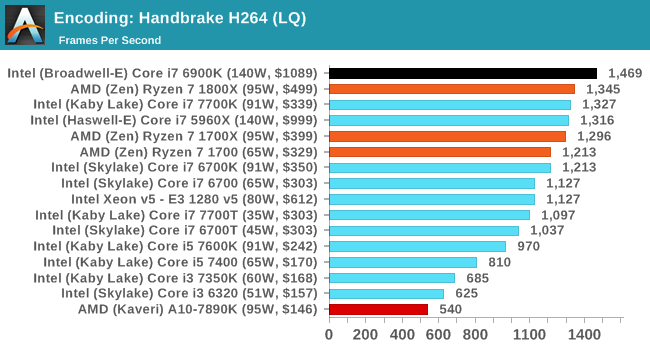
High Quality/Resolution H264: A similar test, but this time we take a ten-minute double 4K (3840x4320) file running at 60 Hz and transcode from Main to High, using the very-fast preset.
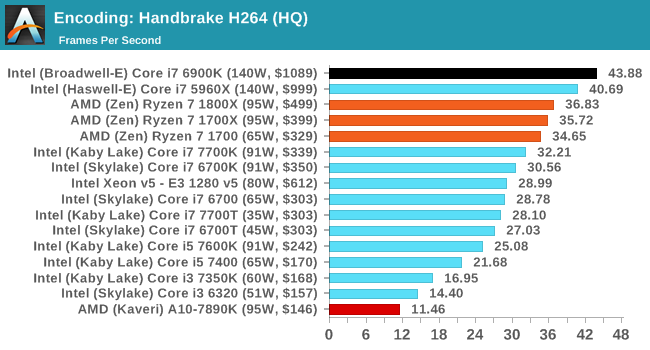
HEVC Test: Using the same video in HQ, we change the resolution and codec of the original video from 4K60 in H264 into 1080p30 HEVC. This causes a dramatic reduction in filesize.
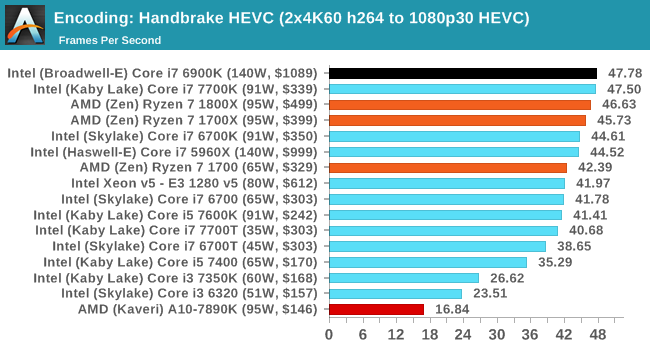










574 Comments
View All Comments
mapesdhs - Sunday, March 5, 2017 - link
Yet another example of manipulation which wouldn't be tolerated in other areas of commercial product. I keep coming across examples in the tech world where products are deliberately crippled, prices get hiked, etc., but because it's tech stuff, nobody cares. Media never mentions it.Last week I asked a seller site about why a particular 32GB 3200MHz DDR4 kit they had listed (awaiting an ETA) was so much cheaper than the official kits for Ryzen (same brand of RAM please note). Overnight, the seller site changed the ETA to next week but also increased the price by a whopping 80%, making it completely irrelevant. I've seen this happen three times with different products in the last 2 weeks.
Ian.
HomeworldFound - Sunday, March 5, 2017 - link
If they were pretty cheap then use your logic, placeholder prices happen. If they had no ETA the chances is that they had no prices. I don't see a shortage of decent DDR4 so it definitely isn't a supply and demand problem. Perhaps you need to talk to the manufacturer to get their guideline prices.HomeworldFound - Sunday, March 5, 2017 - link
Not really. If developers wanted to enhance AMD platforms, or it was actually worth it they'd have done it by now. It's now just an excuse to explain either underperformance or an inability to work with the industry.Notmyusualid - Tuesday, March 7, 2017 - link
@ sedraIt certainly should not be forgotten, that is for sure.
Rene23 - Monday, March 6, 2017 - link
yet people here mentioned multiple times "settled in 2009"; pretending it is not happening anymore, sick :-/GeoffreyA - Monday, March 6, 2017 - link
I kind of vaguely knew that benchmarks were often unfairly optimised for Intel CPUs; but I never knew this detailed information before, and from such a reputable source: Agner Fog. I know that he's an authority on CPU microarchitectures and things like that. Intel is evil. Even now with Ryzen, it seems the whole software ecosystem is somewhat suboptimal on it, because of software being tuned over the last decade for the Core microarchitecture. Yet, despite all that, Ryzen is still smashing Intel in many of the benchmarks.Outlander_04 - Monday, March 6, 2017 - link
Settled in 2009 .Not relevant to optimisation for Ryzen in any way
Rene23 - Monday, March 6, 2017 - link
settled in 2009 does not mean their current compiler and libraries are not doing it anymore, e.g. it could simply not run the best SSE/AVX code path disguised as simply not matching new AMD cpus properly.cocochanel - Saturday, March 4, 2017 - link
One thing that is not being mentioned by many is the increase in savings when you buy a CPU + mobo. Intel knows how to milk the consumer. On their 6-8 core flagships, a mobo with a top chipset will set you back 300-400 $ or even more. That's a lot for a mobo. Add the overpriced CPU. I expect AMD mobos to offer better value. Historically, they always did.On top of that, a VEGA GPU will probably be a better match for Ryzen than an Nvidia card, but I say probably and not certainly.
If I were to replace my aging gaming rig for Christmas, this would be my first choice.
mapesdhs - Sunday, March 5, 2017 - link
Bang goes the saving when one asks about a RAM kit awaiting an ETA and the seller hikes the price by 80% overnight (see my comment above).